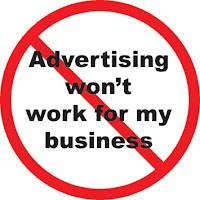Ever wonder why companies like McDonald's and Coca-Cola spend millions on advertising when they're already so well established that it's impossible that no one has ever heard of them? It is just as important for the church to maintain an presence in advertising as it is for them. As a matter of fact, it may be
more important for a church because of the importance of your mission, the saving of souls.
Chances are your church isn't advertising like it should be. You probably have several excuses, and some of them might actually be valid. "We don't have the funds for stuff like that," or "We don't have a good designer to make our ads." Certainly those are reasonable problems, but that doesn't mean you should just give up on advertising. Here are nine solid reasons why your church
needs advertising.
1. It attracts new visitors.
The number one reason to advertise and the number one goal of your advertising should be to attract new people, specifically, the unsaved. Advertising actually has two main purposes. 1) Bring in the lost and 2) Draw in like minded believers. Now it shouldn't ever be our goal to steal folks from another good, Bible believing church, but if they come, they come. Your goal is to attract the lost, grab the attention of new people who have just moved to the area, and give folks a shining light to come to if they are currently in the wrong crowd.
2. Lack of advertising lowers your awareness.

Why do the companies that are popular stay popular? Because they're constantly putting their product in front of your face. TV commercials, bill boards, posters, signs at bus stops, etc. They pull out all the stops to make sure that you can't get them out of your mind. You could have the best product on the market, but if it is not advertised properly, it'll flop.
It amazes me how little churches put into advertising. Sure, they'll put an ad in the paper during Vacation Bible School because they want to attract as many kids as possible. Did your desire to attract people end when Vacation Bible School finished? Probably not. Then why should your advertising?
Advertising increases public awareness. Even if they never come to your church. Even if they never want to, advertising gets your name where it can be seen and heard. Word of mouth can be a powerful tool and keeping your name in the back of their mind is a great way to promote your church.
3. You have the greatest "product" to offer, Jesus Christ.
Some companies fail because they don't have great products. There is no greater thing in life than accepting Christ as Savior. You know it, and I know it, but the people don't. Our ads need to communicate that message. A recent
article I read said that we need to focus less on telling people why we're better than the church downtown and start focusing on telling people why they need Jesus. The article discusses the purpose of the
Got Milk? ad campaigns. The purpose was not to prove their milk was better than their competitor's milk. The goal was to convince people to drink milk.
4. It gets your congregation excited.
Who doesn't want their church to get excited? Every time you put out a new advertisement, a new flyer, or church tract, tell your church. Bring the advertisement and show it to the congregation. People tend to be more excited about church when they see it making progress.
Suppose you attend the same church for 10 years and never see it do anything different. Every week is the same, they never make any progress, never have an building programs, never put on any events. Wouldn't you get bored after awhile? But when your church launches a new ad, it's something new, something interesting and piques people's interest.
Murray River Baptist Church launches a new newspaper ad every two weeks. I'm 10,000 miles away, and I look forward to seeing it posted to Facebook. When I see it, my eyes brighten and I click on the picture to take a closer look. It's exciting to see new advertisements and gets people involved.
5. It builds Authority, Reputation, and Confidence.
When people see or hear a name constantly, they slowly begin to trust it. At first, the thought of randomly showing up at your church is something that scares them. Whether they think your service will be boring, are uncomfortable with the unknown, or just plain don't think they need Jesus. But as they are constantly made more aware of your name, they will become familiar with it.
They'll feel as if they've known you all along. Finally, the thought of visiting won't seem so scary anymore. If your advertising has accomplished its purpose, you'll even have them curious. So curious they can't not visit any longer.
6. It establishes your name and identity.
Identity is important for a church. It's who you are, what you are about, and how you show yourself to the community. In a couple of weeks, I've got a special guest lined up to share an article with you about building your church brand. It sounds weird to call it that, but your logo, letterheads, and business cards are critical for promotion, attraction, and recognition.
7. It gives you the opportunity to share your heart.
Nothing attracts new visitors more than seeing the heart and care of a church. They want to be wanted. They want to feel welcome and loved. Advertising gives you the opportunity to share testimonials of current members. Glad Tidings Omaha communicates this amazingly well on
their website. Murray River Baptist Church featured different church members in their newspaper ad a few months back. It gives you the opportunity to tell the community: "Lives are being changed, yours can change too."
8. It shows community involvement.
Advertising lets the community know that you aren't a secret society. Many people have a misconception that a church is like a club. It's for its members and to become a member you have to be introduced by a current member. This thought creates a feeling of seclusion and separation between you and them. Advertising tells them, "Anyone can come, we welcome and appreciate you. Stop on by." It also tells them that you care about the city you live in, you care about the people around you. You aren't there to serve just a few "privileged" people.
9. It increases your ministry effectiveness.
This is more of a benefit of advertising than it is a reason, but benefits are reasons. More visitors means more people joining the church. More people joining the church means more people to volunteer for work and to participate financially with the church. More people participating means greater opportunity for expansion of your ministry.
Just a word of caution. This should not be the driving force of your advertising campaign. Notice how far down the list it is? Humble yourselves before God, praise Him, and He will lift you up. Never seek to lift yourself up, even if you do, it will be out of wrong motivation and God is not pleased with that.
If you are interested in Advertising ideas or saying "I'd love to do this, but I don't know how," then let me know in the comments below. I'd be more than happy to help you in any way I can.




 5:51 PM
5:51 PM
 T.L. Branson
T.L. Branson




























